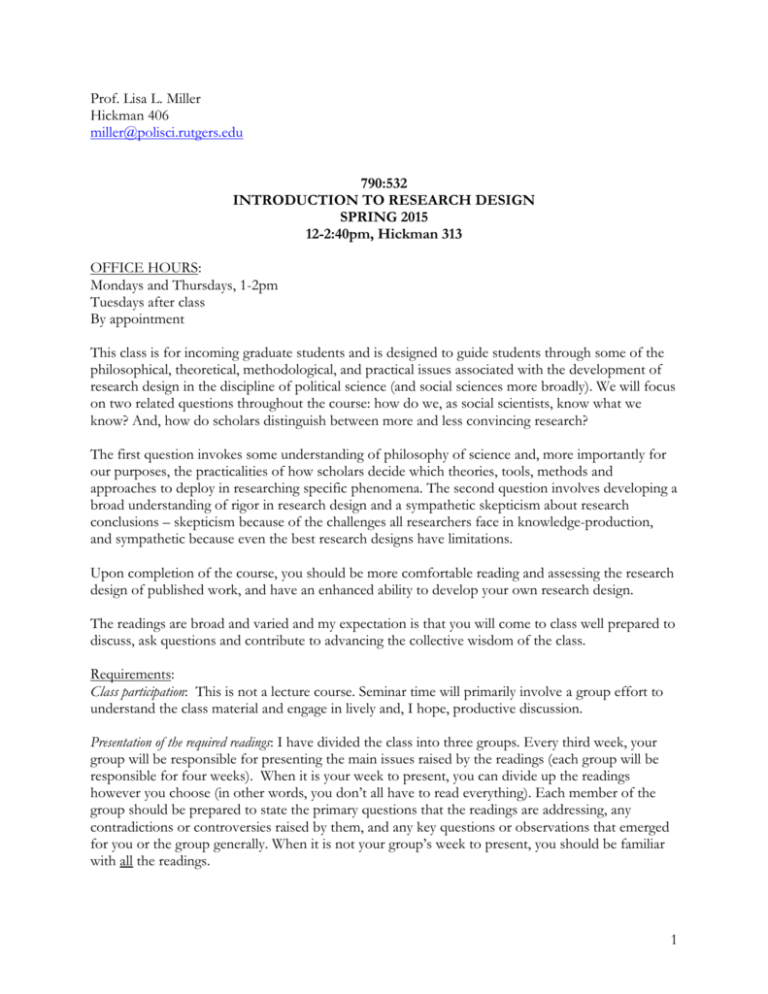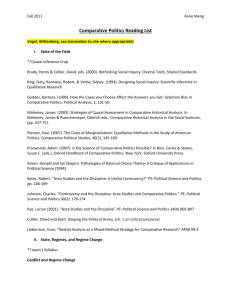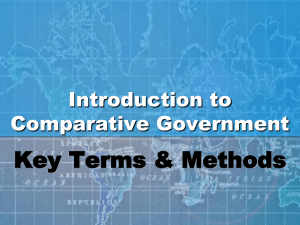Introduction to Research Design - Department of Political Science
advertisement

Prof. Lisa L. Miller Hickman 406 miller@polisci.rutgers.edu 790:532 INTRODUCTION TO RESEARCH DESIGN SPRING 2015 12-2:40pm, Hickman 313 OFFICE HOURS: Mondays and Thursdays, 1-2pm Tuesdays after class By appointment This class is for incoming graduate students and is designed to guide students through some of the philosophical, theoretical, methodological, and practical issues associated with the development of research design in the discipline of political science (and social sciences more broadly). We will focus on two related questions throughout the course: how do we, as social scientists, know what we know? And, how do scholars distinguish between more and less convincing research? The first question invokes some understanding of philosophy of science and, more importantly for our purposes, the practicalities of how scholars decide which theories, tools, methods and approaches to deploy in researching specific phenomena. The second question involves developing a broad understanding of rigor in research design and a sympathetic skepticism about research conclusions – skepticism because of the challenges all researchers face in knowledge-production, and sympathetic because even the best research designs have limitations. Upon completion of the course, you should be more comfortable reading and assessing the research design of published work, and have an enhanced ability to develop your own research design. The readings are broad and varied and my expectation is that you will come to class well prepared to discuss, ask questions and contribute to advancing the collective wisdom of the class. Requirements: Class participation: This is not a lecture course. Seminar time will primarily involve a group effort to understand the class material and engage in lively and, I hope, productive discussion. Presentation of the required readings: I have divided the class into three groups. Every third week, your group will be responsible for presenting the main issues raised by the readings (each group will be responsible for four weeks). When it is your week to present, you can divide up the readings however you choose (in other words, you don’t all have to read everything). Each member of the group should be prepared to state the primary questions that the readings are addressing, any contradictions or controversies raised by them, and any key questions or observations that emerged for you or the group generally. When it is not your group’s week to present, you should be familiar with all the readings. 1 Final paper: The final paper for this class should be related to your (current) research interests. You should identify a limited area of the discipline (preferably within the subfield that interests you most) and identify a question or set of questions for which there exists a body of empirical work. Your task, then, is to review several of those works, preferably from a range of research designs, assess the appropriateness of the approaches, designs, and methods to the questions at hand, and then make an argument for what you see as the best research design for this area of scholarship. Required texts: 1) Babbie, Earl. 2013. The Practice of Social Research, 13th ed. Belmont, CA: Wadsworth Publishing. 2) Brady, Henry and David Collier (eds). 2010. Rethinking Social Inquiry: Diverse Tools, Shared Inquiry. New York: Rowman and Littlefield. 3) Goertz, Gary and James Mahoney. 2012. A Tale of Two Cultures: Qualitative and Quantitative Research in the Social Sciences. Princeton: Princeton University Press. 4) Goertz, Gary. 2006. Social Science Concepts: A User’s Guide. Princeton: Princeton University Press. 5) Gerring, John. Case Study Research. 2007. New York: Cambridge University Press. 6) King, Gary, Robert Keohane, and Sidney Verba, Designing Social Inquiry (Princeton University Press, 1994). Recommended: Box-Steffensmeier, Janet, Henry E. Brady and David Collier. 2008. The Oxford Handbook of Political Methodology. Oxford: Oxford University Press. Kuhn, Thomas. 1962. The Structure of Scientific Revolutions. Chicago: University of Chicago. Maier, Mark H. and Jennifer Imazeki. 2013. The Data Game. London: M.E. Sharpe. Miller, Jane E. 2004. The Chicago Guide to Writing About Numbers. Chicago: University of Chicago Press. Monmonier, Mark. 1996. How to Lie with Maps. Chicago: University of Chicago. Paulson, John Allen. 1991. Innumeracy: Mathematical Illiteracy and its Consequences. New York: Hill and Wang. 2 Week 1, January 20th: Introduction and course overview Required: Babbie, Earl. 2013. The Practice of Social Research, 13th ed. Belmont, CA: Wadsworth Publishing, Chapter one, “An Introduction to Inquiry.” Henry E. Brady, “Introduction to Symposium: Two Paths to a Science of Politics.” Perspectives on Politics June 2004, 2, 2, pp. 295-300. Ian Shapiro, “Problems, methods, and theories in the study of politics, or: what’s wrong with political science and what to do about it.” Political Theory 30 (4), August 2002, pp. 596-619. Recommended: Rudra Sil, “The Division of Labor in Social Science Research: Unified Methodology or Organic Solidarity?” Polity, 32, 4 (Summer 2000), pp. 499-531. Rudra Sil and Peter J. Katzenstein, “Analytic Eclecticism in the Study of World Politics: Reconfiguring Problems and Mechanisms across Research Traditions.” Perspectives on Politics, June 2010, 8, 2, pp. 411-31. Dvora Yanov, “In the house of ‘science’ there are many rooms. Perestroika and the ‘Science Studies’ turn,” in Kristen Renwick Monroe, ed. Perestroika. The Raucous Rebellion in Political Science. New Haven: Yale University Press, pp. 200-217. Week 2, Jan. 27th: Research Design Basics (Group 1) Required: Babbie, Earl. 2013. Chapter Four, “Purpose and Design of Research Project.” In, Earl Babbie, The Practice of Social Research, 13th ed. Belmont, CA: Wadsworth Publishing. Gary King, Robert Keohane, and Sidney Verba. 1994. Designing Social Inquiry: Scientific Inference in Qualitative Research, pp. 3-33. Gary King, Robert O. Keohane, and Sidney Verba, Chapter 7, “The Importance of Research Design,” in Henry E. Brady and David Collier (eds.), Rethinking Social Inquiry: Diverse Tools, Shared Standards. Second Edition (Oxford, UK: Roman and Littlefield, 2004). Gerardo Munck, “Tools for Qualitative Research,” in Henry E. Brady and David Collier (eds.), Rethinking Social Inquiry: Diverse Tools, Shared Standards. First Edition (Oxford, UK: Roman and Littlefield, 2004). Gerring, John. 1999. “What makes a concept good? A criterial framework for understanding concept formation in the social sciences.” Polity 31(3): 357-393. 3 Recommended: Ronald Giere, “The Cognitive Structure of Scientific Theories,” Science Without Laws (Chicago: University of Chicago Press, 1999), pp. 97-117. John Gerring, Social Science Methodology: A Criterial Framework (New York: Cambridge University Press, 2001). Week 3, Feb. 3: Philosophical foundations of social science, building knowledge (All groups) Logical Positivism: Rudolph Carnap, “The Value of Laws: Explanation and Prediction,” An Introduction to the Philosophy of Science: Philosophical Foundations of Physics. New York: Basic Books, 1995, pp. 3-18. Stinchcombe, Arthur. “The Logic of Scientific Inference,” Constructing Social Theories (New York: Harcourt Brace, 1968), 15-43 Falsificationism: Karl Popper, The Logic of Scientific Discovery (New York: Harper and Row, 1968), pp. 78-93. Imre Lakatos, “Falsification and the Methodology of Scientific Research Programmes.” In Lakatos, ed., Criticism and the Growth of Knowledge (Cambridge University Press, 1970), pp. 91138 and 173-180. Naturalism and Anti-naturalism: Carl G. Hempel, “The Function of General Laws in History.” Journal of Philosophy Volume 39, No. 2 (1942), pp. 35-48. Raymond Martin, “The Essential Difference between History and Science.” History and Theory 36 (1997), pp. 1-14. Critical Theory: Walby, Sylvia. 2001. “Against Epistemological Chasms: The Science Question in Feminism Revisited.” Signs 26(2): 485-509. Harding, Sandra. 2001. “Comment on Walby's "Against Epistemological Chasms: The Science Question in Feminism Revisited": Can Democratic Values and Interests Ever Play a Rationally Justifiable Role in the Evaluation of Scientific Work? Signs 26(2): 511-525. Winant, Howard. 2000. “Race and Race Theory.” Annual Review of Sociology 26: 169-185. Group 1: Carnap, Popper, Hemper, Walby; Group 2: Stinchcombe, Lakatos, Martin, Harding; Group3: Stinchcombe, Lakatos, Hempel, Winant. 4 Recommended: Paul M. Churchland, “Folk Psychology and the Explanation of Human Behavior.” Philosophical Perspectives 3 (1989), pp. 225-241. Harding, Sandra G. and Jean F. O’Barr, eds. Sex and Scientific Inquiry. Chicago: University of Chicago Press, 1987. Fritz Machlup, “Are the Social Sciences Really Inferior?” in Michael Martin and Lee C. McIntyre (eds.), Readings in the Philosophy of Science. Cambridge, MA: MIT Press, 1994, pp. 5-21. Max Weber, On the Methodology of the Social Sciences. Week 4, Feb. 10th: Consensus and conflict in research cultures (Group 2) Goertz and Mahoney, A Tale of Two Cultures, Chapters 1-9 Brady and Collier, ch. 2, “The Quest for Standards: KKV’s Designing Social Inquiry.” in Henry E. Brady and David Collier (eds.), Rethinking Social Inquiry: Diverse Tools, Shared Standards. Second Edition (Oxford, UK: Roman and Littlefield, 2004). Recommended: Harold Kinkaid, “Defending Laws in the Social Sciences,” in Michael Martin and Lee C. McIntyre (eds.), Readings in the Philosophy of Science. Cambridge, MA: MIT Press, 1994, pp. 111-131. Dvora Yanow, “Thinking Interpretively: Philosophical Presuppositions and The Human Sciences.” In Dvora Yanow and Peregrine Schwartz-Shea, eds. 2006. Interpretation and Method: Empirical Research Methods and the Interpretive Turn, pp. 5-26. Week 5, Feb. 17th: Concepts and concept formation (Group 3) Giovanni Sartori, “Concept Misformation in Comparative Politics,” American Political Science Review, Volume 64, No. 4 (December 1970), pp. 1033-1046. Gary Goertz, Social Science Concepts: A User’s Guide (Princeton, 2006), Chapters 1-4. Gary Goertz and James Mahoney, A Tale of Two Cultures: Qualitative and Quantitative Research in the Social Sciences (Princeton University Press, 2012), Chapters 10-13. Wedeen, Lisa, 2002. “Conceptualizing Culture: Possibilities for Political Science.” The American Political Science Review; Dec 2002; 96(4): 713-728. Recommended: Giovanni Sartori, “Guidelines for Concept Analysis,” in Sartori (ed.), Social Science Concepts: A Systematic Analysis (Beverly Hills, CA: Sage), pp. 15-48. 5 Robert Adcock and David Collier, “Measurement Validity: A Shared Standard for Qualitative and Quantitative Research,” APSR, 95, 3 (September 2001), pp. 529-546. Week 6, Feb. 24th: Description and Interpretation in the Social Sciences (Group 1) Required: Description as a Scientific Enterprise: John Gerring, Social Science Methodology: A Criterial Framework (New York: Cambridge University Press, 2001), pp. 118-127. Description as an Unscientific Approach: Gary King, Robert O. Keohane and Sidney Verba, Designing Social Inquiry: Scientific Inference in Qualitative Research (Princeton, NJ: Princeton University Press, 1994), pp. 34-75. Interpretation: Geertz, Clifford, “Thick description: Towards an interpretive theory of culture,” The Interpretation of Cultures (New York: Basic Books), 3-32. Albert O. Hirschman, “The Search for Paradigms as a Hindrance to Understanding,” World Politics 22 (April 1970), pp. 329-43. Georg Henrik von Wright, “Two Traditions,” Explanation and Understanding (New York: Cornell University Press, 1971), pp. 1-33. Recommended: Jan Kubik, “Introducing Rigor to the Teaching of Interpretive Methods, Qualitative and Multi-Method Research, Spring 2009, pp, 11-17 (examine the rest of the articles in this Symposium). Charles Taylor, “Interpretation and the Sciences of Man,” in Paul Rabinow and William Sullivan (eds.), Interpretive Social Science: A Second Look (Berkeley, CA: University of California Press, 1987), pp. 33-81. Clifford Geertz, “Deep Play: Notes on a Balinese Cockfight,” in Paul Rabinow and William Sullivan (eds.), Interpretive Social Science: A Reader (Berkeley: University of California Press, 1972), pp. 181-223. Dvora Yanow and Peregrine Schwartz-Shea, eds. 2006. Interpretation and Method: Empirical Research Methods and the Interpretive Turn. Peregrine Schwartz-Shea and Dvora Yanow, Interpretive Research Design. Concepts and Processes (London: Rutledge, 2012). Audie Klotz and Cecelia Lynch, Strategies For Research in Constructivist International Relations (Armonk: M.E. Sharpe, 2007) 6 Week 7: March 3rd, Explanation and Causality (Group 2) Required: Gary King, Robert Keohane, and Sidney Verba. 1994. Designing Social Inquiry: Scientific Inference in Qualitative Research, Chapter 3: Causality and Causal Inference. Henry E. Brady and David Collier (eds.), Rethinking Social Inquiry: Diverse Tools, Shared Standards. Second Edition (Oxford, UK: Roman and Littlefield, 2004), Part I, B: Critiques of the Quantitative Template, chapters 3,4,5 (pgs. 65-98), 7 (111-121), and 9 (161-200). Daniel Little, Varieties of Social Explanation. An Introduction to the Philosophy of Social Science, Westview, pp. 13-38. Gary Goertz and James Mahoney, A Tale of Two Cultures: Qualitative and Quantitative Research in the Social Sciences, Chapters 3-6 (refresher). Recommended: Brady, Henry E. “Causation and Explanation in Social Sciences” (Chapter 10) in Janet M. BoxSteffensmeier, Henry E. Brady, and David Collier, eds, The Oxford Handbook of Political Methodology (Oxford University Press, 2008). Read only sections 1-8, pp. 217-49. Peter Abell, “Causality and Low-Frequency Complex Events. The Role of Comparative Narratives, Sociological Methods and Research 30, 1, August 2001, pp. 57-80. Week 8, March 10th, Experiments, Causality and Mechanisms (Group 3) Required: Babbie, Earl. 2013. The Practice of Social Research, 13th ed. Belmont, CA: Wadsworth Publishing. “Experiments and Experimentation,” Ch. 9 Rebecca Morton and Kenneth Williams, From Nature to the Lab: The Methodology of Experimental Political Science and the Study of Causality, Chapters 1 and 2 Charles Tilly, “Mechanisms in Political Processes,” Annual Review of Political Science, Volume 4 (2001), pp. 21-41. Peter Hedstrom and Richard Swedberg, “Social Mechanisms,” Acta Sociologica, 1996, Vol. 39, pp. 281-308. Recommended: Bositis, David A. and Douglas Steinel. 1987. A Synoptic History and Typology of Experimental Research in Political Science. Political Behavior 7 Bear F. Braumoeller, “Causal Complexity and the Study of Politics,” Political Analysis 11, 3, 2003, pp. 209-33. Bositis, David A. and Douglas Steinel. 1987. A Synoptic History and Typology of Experimental Research in Political Science. Political Behavior Robert Lieberman, “Ideas, Institutions, and Political Order: Explaining Political Change, APSR 96, 4 (December 2002), pp. 697-712 Margaret Mooney Marini, Burton Singer, “Causality in the Social Sciences,”Sociological Methodology, Vol. 18. (1988), pp. 347-409. Week 9, March 17th: Spring break, no class Week 10, March 24th: Historical Approaches and Path Dependence (Group 1) Macro-Historical Analysis and Comparison: Theda Skocpol and Margaret Somers, “The Uses of Comparative History in Marco-social Inquiry,” Comparative Studies in Society and History, 22, 2 (April 1980), pp. 174-97. Peter Hall, “Aligning Ontology and Methodology in Comparative Research,” in James Mahoney and Dietrich Rueschemeyer, eds. Comparative Historical Analysis and Social Sciences. Cambridge UP, 2003, pp. 373-404. Path Dependence: James Mahoney, “Path Dependence in Historical Sociology,” History and Theory, Volume 29, Number 4 (August 2000), pp. 507-548. Paul Pierson, “Increasing Returns, Path Dependence and the Study of Politics,” APSR, Volume 94, Number 2 (June 2000), pp. 251-267. Counter-factuals James D. Fearon, “Counterfactuals and Hypothesis Testing in Political Science,” World Politics, 43, 2 (1991), p. 169-195. Recommended: Mahoney and Rueschemeyer, “Comparative-Historical Analysis: Achievements and Agendas,” in their Comparative Historical Analysis in the Social Sciences (Cambridge, 2003), pp. 3-41. Paul Pierson, “Big, Slow Moving, and Invisible: Macro-Social Processes in the Study of Comparative Politics,” in Mahoney and Rueschemeyer (eds.), Comparative Historical Analysis in the Social Sciences. Cambridge UP, 2003, pp. 177-208. 8 Kathleen Thelen, “How Institutions Evolve: Insights from Comparative-Historical Analysis,” in Comparative Historical Analysis in the Social Sciences. Cambridge UP, 2003, pp. 208-241. Carol E. Cleland, “Methodological and Epistemic Differences between Historical Science and Experimental Science.” Philosophy of Science 69 (September 2002), pp. 474-496. Paul Pierson, “Not Just What, but When: Timing and Sequence in Political Processes,” Studies in American Political Development, Volume 14 (Spring 2001): 72-92. Or Chapter Two in Pierson, Politics in Time. Princeton UP, 2004, pp. 54-78. Robert Jervis, “Timing and Interaction in Politics: A Comment on Pierson,” Studies in American Political Development, 14 (Spring 2001), pp. 93-100. Tim Buthe, “Taking Temporality Seriously: Modeling History and the Use of Narratives as Evidence,” American Political Science Review, 93, 3 (September 2002), pp. 481-93. Robert Jervis, “Timing and Interaction in Politics: A Comment on Pierson,” Studies in American Political Development, 14 (Spring 2001), 93-100. Tim Buthe, “Taking Temporality Seriously: Modeling History and the Use of Narratives as Evidence,” American Political Science Review, 93, 3 (September 2002), 481-93. Week 11, March 31st: Case Studies, Part I (Group 2) Defining case study research: Gerring, John. Case Study Research. 2007. New York: Cambridge University Press, chs 1-4 (pages 1-85). Causal inference and process tracing: Alexander George and Andrew Bennett, “Comparative Methods: Controlled Comparison and Within Case Analysis,” in Alexander George and Andrew Bennett, Case Studies and Theory Development. Cambridge, MA: MIT Press, 2004, pp. 151-181. Collier, David, “Understanding Process Tracing,” PS: Political Science and Politics 44 (2011), pp. 823-30. Goertz, Gary and James Mahoney. 2012. A Tale of Two Cultures: Qualitative and Quantitative Research in the Social Sciences. Princeton: Princeton University Press, chapters 8 and 14. Henry E. Brady and David Collier (eds.), Rethinking Social Inquiry: Diverse Tools, Shared Standards. Second Edition (Oxford, UK: Roman and Littlefield, 2004), Chapter 10. 9 Recommended reading: Alexander George and Andrew Bennett, “Process-Tracing in Case Study Research,” in Alexander George and Andrew Bennett, Case Studies and Theory Development. Cambridge, MA: MIT Press, 2004, pp. 205-233. Derek Beach and Rasmus Brun Pedersen, Process-Tracing Methods. Foundations and Guidelines Ann Arbor, The University of Michigan Press, 2013). Charles C. Ragin and Howard S. Becker (eds.), What is a Case? Exploring the Foundations of Social Inquiry. Cambridge: Cambridge University Press. Barbara Geddes, “How the Cases You Choose Affect the Answers You Get: Selection Bias in Comparative Politics,” Political Analysis 2 (1990), pp. 131-150. Stanley Lieberson. 1992 “Small N's and Big Conclusions: An Examination of the Reasoning in Comparative Studies Based on a Small Number of Cases.” Ch. 4 in Charles C. Ragin and Howard S. Becker (eds.), What is a Case? Exploring the Foundations of Social Inquiry. Cambridge: Cambridge University Press. Andrew Abbott. 1992. “What do Cases Do?” Pp. 53-82 in Charles C. Ragin and Howard S. Becker (eds.), What is a Case? Exploring the Foundations of Social Inquiry. Cambridge: Cambridge University Press. David Byrne. 2009. “Introduction: Case-Based Methods: Why We Need Them; What They Are; How to Do Them.” Pp. 1-10 in The SAGE Handbook of Case-Based Methods. David Byrne and Charles C. Ragin (eds.). London: SAGE Publications Ltd. King, Keohane and Verba, Designing Social Inquiry, pp. 128-149. Week 12, April 7th: Case Study, Part II (Group 3) General: Jack Levy, “Counterfactuals and Case Studies,” in (Chapter 27) in Janet M. BoxSteffensmeier, Henry E. Brady, and David Collier, eds, The Oxford Handbook of Political Methodology. Oxford University Press, 2008, pp. 627-44. D. Collier, “The Comparative Method,” Political Science: The State of the Discipline II, A. W. Finifer, ed. APSA, 1993, 105-119. Comparative case design: Stanley Lieberson, “Small N’s and Big Conclusions: An Examination of the Reasoning in Comparative Studies Based on a Small Number of Cases,” Social Forces, Volume 70, Number 2 (December 1991), 307-320. 10 Douglas, Dion, “Evidence and Inference in the Comparative Case Study,” Comparative Politics, 30, 2 (January 1998), pp. 127-145. Structured, Focused comparison: Alexander George and Andrew Bennett, “The Method of Structured, Focused Comparison,” in Alexander George and Andrew Bennett, Case Studies and Theory Development. Cambridge, MA: MIT Press, 2004, pp. 67-73. Recommended: Andrew Bennett. 2008. “Process Tracing: A Bayesian Perspective.” Chapter 30 in, The Oxford Handbook of Political Methodology, Janet M. Box-Steffensmeier, Henry E. Brady, and David Collier (eds.). Oxford University Press. Jeffrey M. Paige. 1999. "Conjunction, Comparison, and Conditional Theory in Macrosocial Inquiry." American Journal of Sociology. 105 (November): 781-800. [section on Kimeldorf and historically conditional theorizing, pp. 786-789 only] Ann Chih Lin. 1998. “Bridging Positivist and Interpretivist Approaches to Qualitative Methods.” Policy Studies Journal 26:162–80. [searching for mechanisms] Mario Small. 2009. "'How many cases do I need?' On science and the logic of case selection in fieldbased research." Ethnography 10,1: 5-38 Peter Abell. 2001. “Causality and Low-Frequency Complex Events. The Role of Comparative Narratives.” Sociological Methods and Research. 30(1):57-80. Robin Stryker. 1996. “Beyond History Versus Theory: Strategic Narrative and Sociological Explanation.” Sociological Methods and Research. 24:304-352. Rebecca Jean Emigh. 1997. “The Power of Negative Thinking: The Use of Negative Case Methodology in the Development of Sociological Theory.” Theory and Society 26:649-84. [discusses the critique of 1980s comparative studies] Qualitative Comparative Analysis recommended: Charles Ragin, The Comparative Method. Moving Beyond Qualitative and Quantitative Strategies (Berkeley, University of California Press, 1987), pp.1-102. Benoit Rihoux and Giselle De Meur, “Crisp-Set Qualitative Comparative Analysis (csQCA), in Benoit Rihoux and Charles Ragin, eds. Configurational Comparative Methods. Qualitative Comparative Analysis (QCA) and Related Techniques (London, Sage, 2009), pp. 33-68. Carsten Schneider and Wagemann, Set-Theoretic Methods for the Social Sciences. A Guide to Qualitative Comparative Analysis (Cambridge: Cambridge University Press, 2102). 11 Jack Levy, “Counterfactuals and Case Studies,” in (Chapter 27) in Janet M. Box-Steffensmeier, Henry E. Brady, and David Collier, eds, The Oxford Handbook of Political Methodology. Oxford University Press, 2008, pp. 627-44. Stanley Lieberson, “Small N’s and Big Conclusions: An Examination of the Reasoning in Comparative Studies Based on a Small Number of Cases,” Social Forces, Volume 70, Number 2 (December 1991), pp. 307-320. Arend Lijphard, “The Comparable-Cases Strategy in Comparative Research,” Comparative Political Studies, 8, (1975), pp. 158-177. D. Collier, “The Comparative Method,” Political Science: The State of the Discipline II, A. W. Finifer, ed. APSA, 1993, pp. 105-119. David Collier and James Mahoney, “Insights and Pitfalls: Selection Bias in Qualitative Research,” World Politics, 49, 1 (1996), pp. 56-91. Van Evera, Guide to Methods for Students of Political Science, pp. 77-88. Week 13, April 14th: Field Research Part I, Interviews and Focus Groups (Group 1) Surveys and Interviewing: Babbie, Earl. 2013. The Practice of Social Research, 13th ed. Belmont, CA: Wadsworth Publishing, Chapter 8 (228-269). Herbert F. Weisberg. 2005. “Sampling Error. The Need for Representativeness,” in The Total Survey Error Approach. Chicago: The Chicago University Press, pp. 225-57. Conducting Elite Interviews: Beth Leech, “Interview Methods in Political Science,” PS: Political Science and Politics, 35, 4 (December 2002), pp. 663-664. Beth Leech, “Asking Questions: Techniques for Semi-structured Interviews,” PS: Political Science and Politics, 35, 4 (December 2002), pp. 665-668. Kenneth Goldstein, “Getting in the Door: Sampling and Completing Elite Interviews,” PS: Political Science and Politics, 35, 4 (December 2002), pp. 669-672. Joel D. Aberbach and Bert A. Rockman, “Conducting and Coding Elite Interviews,” PS: Political Science and Politics, 35, 4 (December 2002), pp. 673-676. Jeffrey M. Berry, “Validity and Reliability Issues in Elite Interviewing,” PS: Political Science and Politics, 35, 4 (December 2002), pp. 679-682. 12 Shannon Werning Rivera, Polina M. Kozyreva and Edvard G. Sarvoskii, “Interviewing Political Elites: Lessons from Russia,” PS: Political Science and Politics, 35, 4 (December 2002), pp. 683-688. Focus Groups: David Morgan, Focus Groups as Qualitative Research, 2nd Edition (Newbury Park: Sage, 1997), pp. 7-30. Recommended: Herbert Asher. 2009. “Chapter 3: Wording and Context of Questions,” in Polling and Public: What Every Citizen Should Know. Sixth Edition. Washington, D.C.: CQ Press, pp. 50-68. Janet Buttolph Johnson and H. T. Reynolds. 2012. “Chapter 10: Survey Research and Interviewing,” in Political Science Research Methods. Seventh Edition. Los Angeles: Sage/CQ press, pp. 297-350. Week 14, April 21st: Field Research, Part II: Ethnography (Group 2) Richard F. Fenno, Jr., “Observation, Context, and Sequence in the Study of Politics,” APSR, 80, 1 (March 1986), pp. 3-15. Charles Tilly, “Afterword: Political Ethnography as Art and Science,” Qualitative Sociology (2006) 29, pp. 409-12. Myron Aronoff and Jan Kubik, Anthropology and Political Science. A Convergent Approach (New York: Berghahn Books, 2013), Chapter “Methods: Ethnography and Case Study,“ pp. 23-59. Katherine Cramer Walsh, “Scholars as Citizens: Studying Public Opinion through Ethnography,” Political Ethnography: What Immersion Contributes to the Study of Power, Edward Schatz, ed., 2009, University of Chicago Press, 2009), pp.165-82. Recommended: Richard F. Fenno, Jr., “Appendix: Notes on Method: Participant Observation,” in Richard F. Fenno, Jr., Home Style: House Members and their Districts (Scot, Foresman and Company, 1978), 249-295. Richard F. Fenno, Jr., “U.S. House Members and Their Constituencies: An Exploration,” APSR, 71, 3 (September 1971), 883-917. Robert Aunger, “On Ethnography: Storytelling or Science?” Current Anthropology, 36, 1 (February 1995): 97-130. Lisa Wedeen, “Reflections on Ethnographic Work in Political Science,” Annual Review of Political Science, 2010, 13, pp.255-72. 13 Week 15, April 28th: Field Research, Part III: Archival and content analysis (Group 3) Required: Introduction to Archival Methods: Louis Gottschalk, “What are History and Historical Sources,” in Understanding History: A Primer on Historical Method 2nd Edition (New York: Knopf, 1969), Ch. 3, pp. 41-61. Content and Discourse Analysis Procedures: Ruth Wodak, “Pragmatics and Critical Discourse Analysis. A Cross-disciplinary Inquiry,” Pragmatics & Cognition 15:1 (2007), pp. 203–225. Yoshiko M. Herrera and Bear F. Braumoeller, et al. “Symposium: Discourse and Content Analysis,” Qualitative Methods, Spring 2004, pp. 15-39. Cathy Cohen, “All the Black People Fit to Print,” in Cathy Cohen, Boundaries of Blackness: AIDS and the Breakdown of Black Politics (Chicago: University of Chicago Press, 1999), pp. 150185. Overcoming Selection Bias: Ian Lustick, “History, Historiography, and Political Science: Multiple Historical Records and the Problem of Selection Bias,” APSR, 90, 3 (September 1996), pp. 605-618. Recommended: Louis Gottschalk, “Where Does Historical Information Come From?” in Understanding History: A Primer on Historical Method 2nd Edition (New York: Knopf, 1969), Ch. 5, pp. 86-115. Deborah W. Larson, “Sources and Methods in Cold War History: The Need for a New Theory Based Archival Approach,” in Colin Elman and Miriam Fendius Elman (eds.), Bridges and Boundaries: Historians, Political Scientists, and the Study of International Relations (Cambridge, MA: MIT Press, 2001), pp. 111-135. C.B. McCullough, “Bias in Historical Description, Interpretation, and Explanation,” History and Theory 39 (2000), pp. 39-66. Alexander L. George, “Knowledge for Statecraft: The Challenge for Political Science and History,” International Security, 22, 1 (Summer 1997), pp. 44-52. Early Attempts at Content Analysis: Harold D. Lasswell, “Why be Quantitative?” in Harold D. Laswell and Nathan Leites (eds.), Language of Politics: Studies in Quantitative Semantics. New York: George W. Stewart Publishing, 1965, pp. 40-54. Siegfried Kracauer, “The Challenge of Qualitative Content Analysis,” The Public Opinion Quarterly, 16, 4 (Winter, 1952-1953), pp. 631-642. 14 More on Content Analysis: Janet Buttolph Johnson and H.T. Reynolds, “Content Analysis,” Political Science Research Methods 5th Edition (Washington, DC: CQ Quarterly Press, 2004), p. 222-236. Martin Gilens, “The News Media and the Racialization of Poverty,” in Martin Gilens, Why Americans Hate Welfare: Race, Media, and the Politics of Antipoverty Policy (Chicago: University of Chicago Press, 1999), pp. 102-132. Rodney Bruce Hall, “The Discursive Demolition of the Asian Development Model.” International Studies Quarterly, 47, 4 (March 2003): pp. 71-99. Kassarjian, Harold, “Content Analysis in Consumer Research.” Journal of Consumer Research, 4 (June 1977), pp. 8-18 15





